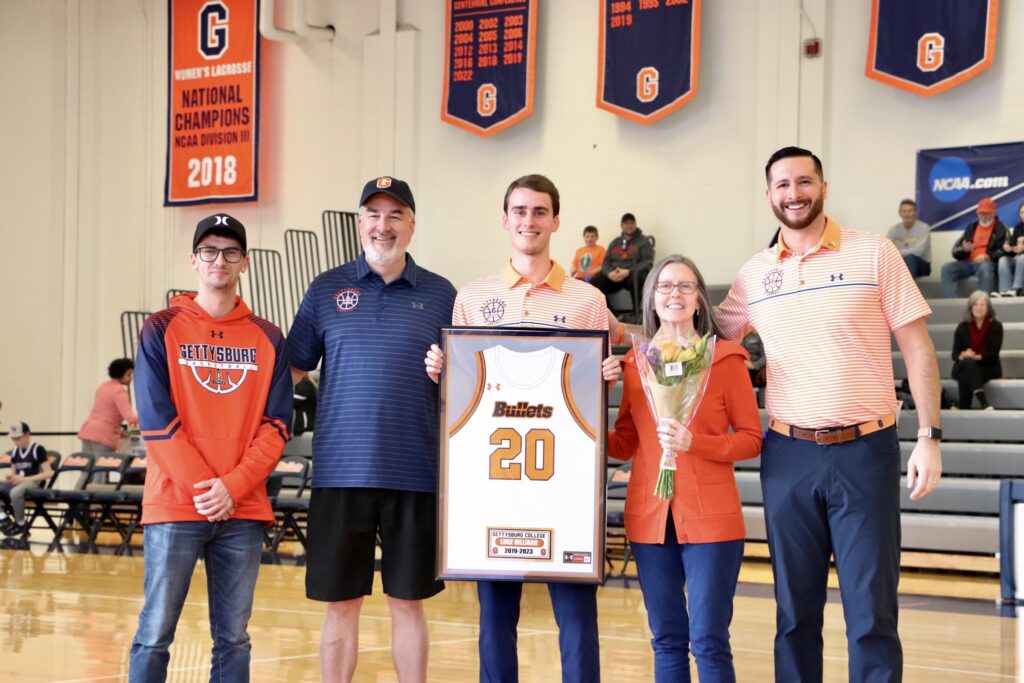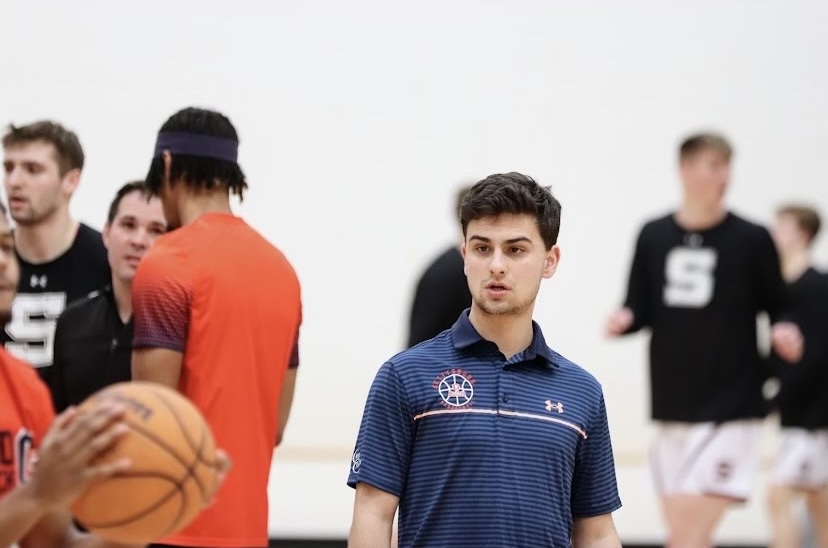Inside Gettysburg Athletics: Student Team Managers and Assistant Coaches
By Jack Herr, Sports Editor
Student team managers and assistant coaches are the unsung heroes of Gettysburg athletics. While not every team has them, they are crucial to their team’s success, only in less visible ways. Though they do not receive as much fanfare for their behind-the-scenes work as the players, they show an equal level of dedication to their teams.
The men’s basketball team has two such individuals: Andrew Winton ’23, student assistant coach, and Luke Hilliard ’23, team manager. Winton, a psychology major from New York, and Hilliard, a mathematical economics major and East Asian studies minor from New Jersey, have both been with the team since their first years. Winton joked that his minor is “basketball,” given the time he and Hillard commit daily to the team.

Luke Hillard (Photo Tim Pernetti/The Gettysburgian)

Andrew Winton (Photo Tim Pernetti/The Gettysburgian)
The two attend every practice and game, and that’s just the beginning of their involvement. At practice, both are assigned various tasks: helping run drills, operating the clock, refereeing pick-up games, rebounding, filling water bottles, and giving players simple pointers or words of encouragement. At games, Hilliard sits at the courtside table and maintains the book, keeping accurate scores and statistics. Winton sits with the team on the bench, filling out a game sheet that requires him to keep track of the success rate of different plays.
As Hilliard put it, their goal is to “be someone who’s just reliable and can kind of do a little bit of whatever they need [us] to do.”
Winton also said he has been in the office a lot more this year to help run the operations of the program off the court. For example, he sometimes watches game film and takes notes for scouting. Although his contributions to staff meetings are not comprehensive, he is mainly there to be a “fly on the wall, learning a lot from [the coaches].”
Hilliard also reflected on the contributions he makes outside of basketball. He emphasized that he is always there to keep a player company by “getting food with them, walking with them somewhere across campus, helping them with homework…[or] doing whatever they need me to do and doing it with a smile.”
Hilliard’s response alludes to how both he and Winton genuinely feel like they are part of the team, although neither gets any playing time. In fact, Winton lives with several team members on campus. He remarked that Gettysburg being a Division III program amplifies his ability to feel included. “Because we have such a small staff, I am involved in more ways than I think,” he said. “I’ve talked to friends of mine that are managers at other schools that are not allowed to be friends with the players…So I’ve been pretty lucky in that regard.”
When asked about their favorite moments from this past season, Hilliard and Winton gave different answers. Hilliard’s season highlight came on Jan. 7, 2023, when the Bullets beat Centennial Conference foe Ursinus on the road 80-77 in overtime. Hilliard reminisced about the way his team “completely stunned their crowd. It was silent. [Ursinus] was completely shocked. They were just humiliated in front of their home crowd.”
Winton, on the other hand, chose a moment where the crowd was electrified, this time in the home of the orange and blue, Bream Gymnasium. Their senior day win over Swarthmore, which at the time was ranked ninth in the country, was an “emotional” day for him.
“Being able to celebrate Elijah, Sukky, and Josh and then being able to get a win was really cool,” said Winton.
Both Winton and Hilliard said that their experiences will help them pursue sports careers following their graduation in May. Winton came to Gettysburg knowing he wanted to be involved in sports, and the added responsibility from becoming a student assistant coach only helped confirm that passion. Winton credited head coach B.J. Dunne and assistant coach Evan Elberg for mentoring him. He said,“I’m going to take a lot from them.”
Similarly, Hilliard thanked Dunne and Elberg for helping him realize “how much more joy you can get out of being happy for other people than just yourself.” Seeing the coaching staff and players turn the program around heightened his appreciation for collaboration and teamwork. Hilliard interned with Princeton University’s men’s basketball program in the previous summer, an experience that cemented his career ambitions in the sports management world. He plans to combine the analytical skills he developed from his mathematical economics major with his passion for basketball.
Jentle Sheridan ’24, manager for the women’s basketball team, also gave her perspective on the responsibilities of being a team manager. A business, organization, and management studies major from New Jersey, she originally wanted to try out for the team.
Sheridan secured a meeting with the coaches, who let her know that while they already had a large enough team, they were looking for a manager. “I accepted the position because I still wanted to be around basketball even if I couldn’t play,” she said. “The manager position would be a new perspective for me in basketball because I had only ever played. I decided to see where it would take me and what I could learn from it.”
Sheridan explained that her duties are similar to those maintained by Winton and Hilliard. She attends every practice, runs the clock, keeps track of the practice schedule, and also does the book on game days.
“On game days when I’m doing the book, the assistant coach checks with me frequently throughout the game to make sure that she has the correct information so she can relay that to the head coach,” she commented. “This allows them to make important decisions about the game – for example, when to take a player out if they are in foul trouble so that the team’s chances of winning increases.”
Because her past experiences were on the court, Sheridan noted that she does sometimes “feel more on the outside” of what is happening on the court because she “knows what it means and feels like to be part of a team, and [she doesn’t] have that feeling here.” Nonetheless, she relished being a part of the team’s success this past season.
“My favorite moment from this past season was watching this young team develop from the beginning to the end of the season and being able to win another conference championship even when doubted,” said Sheridan. The Bullets won their second straight Centennial Conference championship with a 65-52 win over Johns Hopkins on Feb. 26. They advanced to the NCAA DIII tournament but lost in the first round.
Unlike Winton and Hilliard, Sheridan, being a junior, has another year left as team manager to develop important skills that will serve her in her future.
“The main skill that matured from this position has been my keen attention to detail, which comes from recording stats at games,” she explained. “I will use this in my future career to be able to excel at my job and identify mistakes when made. Being detail-oriented makes many tasks run smoother and saves time in my opinion.”
Without the aid of student-team managers and assistant coaches, teams would function with less efficiency. The intimacy of the Division III athletics experience allows these individuals to make noticeable impacts on the teams they work for, both in competition and off the court.
This article originally appeared on pages 22 and 23 of the March 2023 edition of The Gettysburgian’s magazine.
